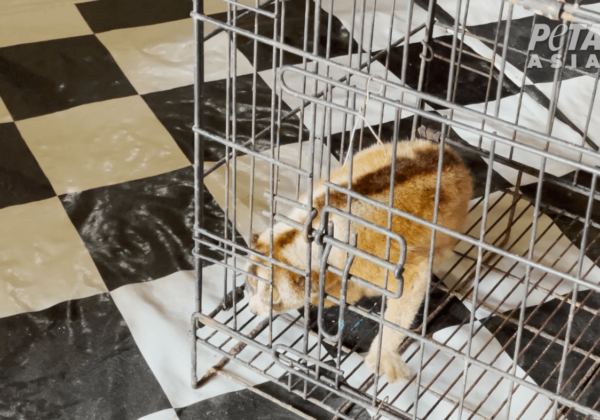Dear Everyone, Tigers Are Not Selfie Props
Even though 137 tigers held captive at Thailand’s Tiger Temple were seized and transferred to animal refuges around the country, thousands of other tigers around the world are still currently held in captivity and forced to perform for human entertainment.
Tigers at Tiger Temple were heavily sedated so that tourists could touch and hug them or snap a selfie for a fee. The tigers’ movements were restricted, and the resident monks at the temple reportedly beat the frustrated animals when they refused to cooperate.
Tiger Temple is now closed, but other facilities, such as the Sriracha Tiger Zoo and Samui Aquarium & Tiger Zoo, also located in Thailand, still continue to allow people to take “tiger selfies.” Facilities likes these give people the false idea that big cats are little more than cuddly kitties who can be used and abused for our entertainment.
Promoted widely by travel companies and travel websites, the Sriracha Tiger Zoo and Samui Aquarium & Tiger Zoo encourage visitors to pay to take photos with adult tigers and tiger cubs and feed the cubs milk with baby bottles. The cubs are forcibly separated from their mothers when they are only weeks old.
Animals All Over the World Are Dying for SelfiesTigers at the Sriracha Tiger Zoo and Samui Aquarium & Tiger Zoo endure life sentences in prison-like cages that are sometimes only 2 meters by 3 meters. They are also forced to perform tricks and behave in ways that are unnatural to them, such as standing on their hind legs, perching on stools, balancing on bridges, and jumping through rings of fire.
Tigers are innately terrified of fire. In order to condition tigers to make these dangerous leaps, handlers must routinely physically punish animals who do not comply. Tigers will perform tricks like this only once the pain and fear of punishment have overcome their instinctual fear of fire. Starving tigers is another common form of punishment when they don’t obey their handlers’ instructions.
Watch how tigers and other animals suffer in the circus industry in China.
Sriracha Tiger Zoo reportedly houses 350 tigers, more than any other facility in Thailand. According to Thai authorities, there are 1,500 captive tigers in the country.
Zoos and safari parks that do not allow the public to touch tigers or force them to perform tricks are little better. Captivity is a living hell for all animals and denies them the opportunity to engage in any of the activities that give their lives meaning. No animal can thrive in such an artificial and stressful environment. Zoos and safari parks are profit-driven ventures that exist to make money, not to protect animals. Bangkok’s Pata Zoo cages over 200 animals on top of a department store. All the animals here, including tigers and gorillas, share only 800 square meters. Need more reasons to shun this decrepit menagerie?

There’s nothing educational about seeing deprived, depressed animals – many of whom have been driven insane by captivity – pacing, swaying, or circling, and it teaches children nothing about normal animal behavior. We certainly wouldn’t take our children to a prison in order to teach them about human behavior. They can learn far more valuable and inspiring lessons by watching nature documentaries or IMAX films that feature animals in the wild.
What You Can Do
As long as tickets continue to be sold, animals will continue to be trafficked, traded, and tortured. Please, pledge never to visit any place that profits from live animals.
These Videos Prove That Animals Don't Want to be PrisonersAlways make sure that you’re visiting a reputable sanctuary, and urge friends and family to leave cruel tourist traps off their vacation itineraries.Remember: Animals are not ours to use for entertainment, nor are they photo props for selfies. If there’s any risk that your vacation experience is going to hurt or cause stress to an animal, it’s not worth it.









